Meet the 2023 DDF Diversity Scholarship Cohort
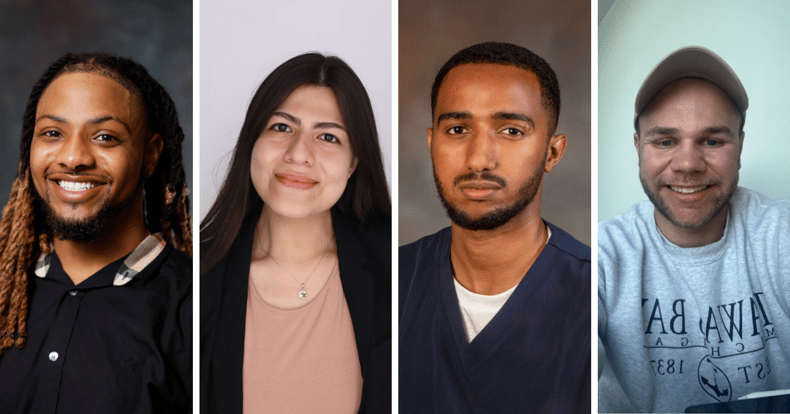
In 2021, with the goal of making dental education more accessible, helping to diversify the dental profession and improving oral health equity, the Delta Dental Foundation (DDF) launched the Diversity Dental Student Scholarship. Given annually, these $25,000 scholarships are awarded to students from a historically or systemically disadvantaged racial and ethnic background entering dental school in Michigan, Ohio and Indiana.
The first year of dental school began with classes starting between June and August for this year’s Diversity Dental Student Scholarship recipients. They’re already getting hands-on experience, participating in study groups and taking anatomy courses.
The DDF spoke to the students to learn more about their journey to dental school and how it’s going now that they’re there.
Frida Sandoval, University of Michigan School of Dentistry
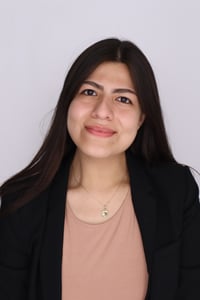 “I asked my high-school jewelry teacher for [career] advice,” Frida Sandoval said. At the time, she considered herself an art student. “I told her I wanted to go into health care, but I didn’t know what I wanted to do. She said that dentistry is like making jewelry in someone’s mouth.” Interest piqued, Sandoval started researching the paths that would take her to dental school.
“I asked my high-school jewelry teacher for [career] advice,” Frida Sandoval said. At the time, she considered herself an art student. “I told her I wanted to go into health care, but I didn’t know what I wanted to do. She said that dentistry is like making jewelry in someone’s mouth.” Interest piqued, Sandoval started researching the paths that would take her to dental school.
As an undergraduate, Sandoval studied public health and anthropology, both of which informed her journey in unexpected ways.
“You know, you look at teeth a lot [in anthropology], too. Teeth can tell you so much about a person—all these classes really helped to solidify the fact that I was doing what I wanted to do,” she said. “But public health is my primary motivator.”
Sandoval explained that she grew up around people experiencing financial hardship in Detroit, where many of the people she knew couldn’t afford regular dental care. At the time, she assumed that was normal. However, as she learned more about public health and the barriers to care that make it harder for many people, especially those without insurance or those from historically and systemically disadvantaged backgrounds, to get the care they need.
“I suddenly realized that it didn’t have to be this way,” she said. “That’s why I need to go into dentistry, why I want to practice in Detroit. I need to work with the people in my community who don’t have other options, and I want to teach young people about good oral health early, before they start developing cavities.”
Now, as a first-year dental student, Sandoval is taking advantage of the resources the University of Michigan School of Dentistry offers. She’s a student member of the American Association of Public Health Dentistry, among other student groups, in which she can regularly learn, network and volunteer within the community. When it comes to class, Sandoval’s favorite is the simulation lab.
“It reminds me of when I was in the jewelry classroom, using a handpiece. The sim lab lets me put into practice what I learned in oral anatomy, getting the functionality and aesthetics right. The fact that I can use my art skills to make a difference in someone’s life is so good.”
Ali Elhag, Indiana University School of Dentistry
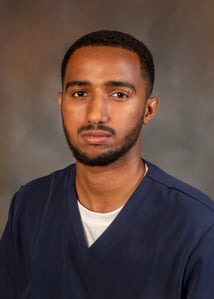 Hard work doesn't scare Ali Elhag. As a first-generation college student who was encouraged by his dad to be an engineer or a doctor, he knew from a young age that he had a challenging path ahead of him. Although he initially explored computer engineering, he didn’t enjoy it, and he decided to pursue his father’s other suggested career path: health care. As an undergrad, Elhag had the opportunity to shadow a dentist. Everything clicked.
Hard work doesn't scare Ali Elhag. As a first-generation college student who was encouraged by his dad to be an engineer or a doctor, he knew from a young age that he had a challenging path ahead of him. Although he initially explored computer engineering, he didn’t enjoy it, and he decided to pursue his father’s other suggested career path: health care. As an undergrad, Elhag had the opportunity to shadow a dentist. Everything clicked.
“One of the most important things you notice about people is their smile,” Elhag said. “It gives you confidence. I want to help them get that back.”
He’s also interested in giving back to the community where he grew up.
“In Sudan, the medical system is not the same as it is here. When I went to the dentist [in Sudan], I didn’t like it because it was scary and painful, but dentistry here? It’s much better, and they do their best to make you comfortable,” Elhag reflected.
Although he plans to stay in Indiana after graduation, he does plan to visit Sudan to lend a hand.
“The shortage of dentists here—and in Sudan—is a big inspiration to me,” Elhag said. “Eventually, I want to see how I can improve oral health there, whether that’s just talking to dentists, educating them or seeing what I can do improve sterilization and sanitation, which are big issues.”
To do that, you need to build trust.
Elhag believes that the patient experience is a critical—and often overlooked—part of dentistry, and his favorite class is about ethics and behavior. “Dentistry isn’t just about how smart you are or how good you are with your hands. You have to know how to communicate with people, cross barriers and learn how to be good at that,” Elhag said.
Keith Watson Jr., The Ohio State University College of Dentistry
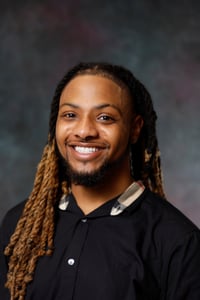 Keith Watson Jr.’s road to dental school wasn’t a straight path. He considered medical school and even becoming a pharmacist before he decided on dentistry. What helped lead Watson to dentistry was that the other options left him missing the interactions with people and serving others.
Keith Watson Jr.’s road to dental school wasn’t a straight path. He considered medical school and even becoming a pharmacist before he decided on dentistry. What helped lead Watson to dentistry was that the other options left him missing the interactions with people and serving others.
“I felt stagnant all day [during pharmacy school]. I’d go home and be brain tired but not body tired. When I started shadowing dentists, I literally felt the difference because you’re making that tangible change with your hands. I can use my being to create a change on my patient’s face, enhancing their physical and mental health,” Watson said.
Although it’s still early, his primary desire is to work with pediatric patients and patients with disabilities.
“Dentistry is about providing services, and I believe the most vulnerable populations in dentistry are children and people with disabilities,” Watson said. During his first semester as a dental student, he was accepted into the American Academy of Pediatric Dentistry as a pre-doctoral student and is planning to join The Ohio State University College of Dentistry’s student chapter of the Special Care Dentistry Association next semester.
“The faculty are constantly sharing the importance of working with passion and placing service at the forefront of your work, vocalizing how easy it is to burn yourself out in pursuit of making money. They emphasize that dentistry is a service-oriented profession, and while I know no one can truly ‘pack back,’ I place my focus on continuing to pay it forward,” Watson said.
Watson loves the challenge of education. His favorite class has been the hardest because of how much it pushes him. “Dr. Weiss and her dental anatomy class forces me to dive deeper into myself. She helped reintroduce tenacity in myself and remind me that hard work beats talent,” Watson mused. Dr. Weiss also gave him the most important advice during his first semester, which is that “hand skills and intelligence are not synonymous” and that you have to practice as much in the pre-clinical lab as you commit to the library to become a successful dentist.
As a first-generation college student, Watson noted that he has a different perspective from some of his classmates, many of whom come from long lines of dentists. His goal? Make dentistry a better community for everyone.
“I know I didn’t get here by myself. Now that I am here, it is important for me to reach back down and help the other people struggling, even if they don’t look like me,” Watson said. “Becoming a doctor is one of my wildest dreams.”
Masey Seals, University of Detroit Mercy School of Dentistry
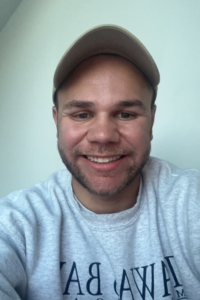 As a kid, Masey Seals’ mouth made him feel self-conscious, largely because of a dental disease that interfered with the formation of his adult teeth. He didn’t take school photos, and he seldom smiled. Eventually, Seals realized that his experiences with oral health and the dentist’s office were not unique.
As a kid, Masey Seals’ mouth made him feel self-conscious, largely because of a dental disease that interfered with the formation of his adult teeth. He didn’t take school photos, and he seldom smiled. Eventually, Seals realized that his experiences with oral health and the dentist’s office were not unique.
“Eventually, I started shadowing at my local dental clinic, and that’s where I got my first real exposure to the dental field,” Seals said. “I saw people come to the office in extreme pain, and a dentist could help them quickly. I knew I wanted to be that person and give them the smile they wanted.”
With an undergraduate education in psychology and minors in biology and chemistry, Seals finds himself gravitating toward science classes. An oral-facial class about how teeth develop, conditions relating to that and different structures in the mouth was his favorite of the fall semester.
“It’s great to learn about the basics of science but learning what we will be utilizing in the future is even better,” Seals said.
Classmates and faculty have been a huge help in the adjustment process of dental school. Helping each other out and sharing study guides eased the transition.
With nearly a full semester of dental school under his belt, Seals still plans to become a general dentist and stay in Michigan. One of his goals is to be involved in the community and give back.
“There were periods of time in my own life where we couldn’t afford dental care and we had to go to free clinics. I know how it is to not have access or the money to afford it, so I want to help people in my community who are struggling,” Seals said.
To learn more about Delta Dental Foundation scholarships and student awards, click here.
